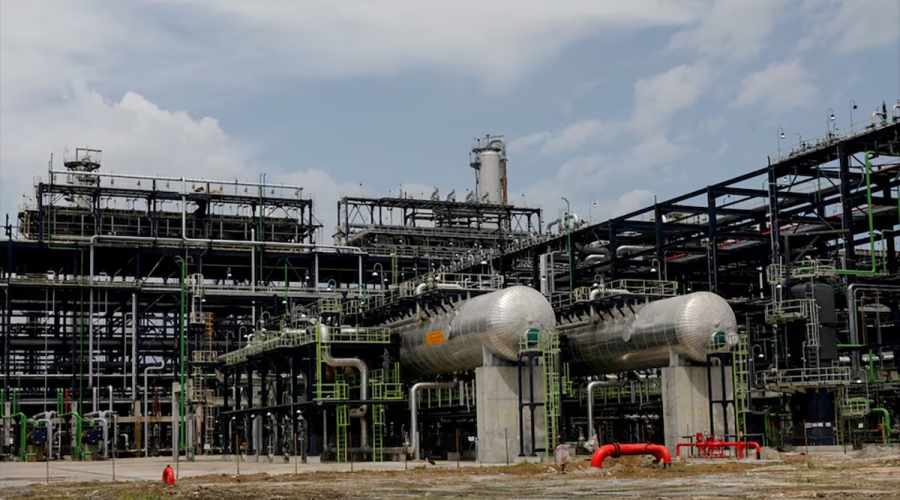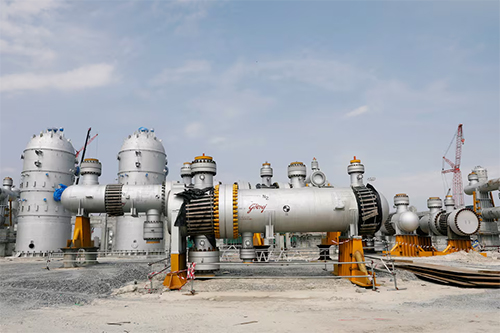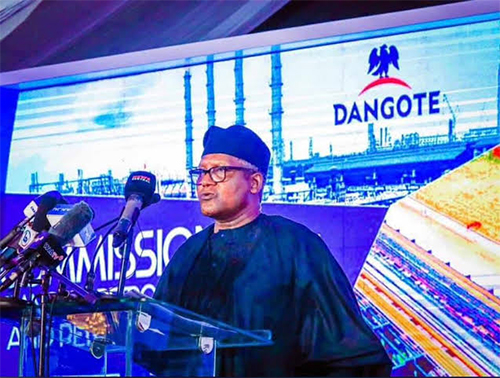Monopoly or Progress? Dangote vs. Nigeria’s Corrupt Elite

Aliko Dangote's refinery isn’t just shaking up Nigeria’s oil industry - it’s threatening the corrupt elites and foreign oil giants that have long profited from the country’s oil dysfunction. Are their days numbered?
Aliko Dangote, Africa’s wealthiest man, has achieved what many have deemed impossible. His $19 billion Dangote Refinery, sprawling across an expanse larger than Victoria Island in Lagos, stands as a testament to ambition. Touted as the largest single-train refinery in the world, this massive project is poised to reshape not just Nigeria’s economy, but also the broader African energy and industrial sectors. It promises to transform Africa’s dependence on foreign refined oil, promote regional economic integration, and create jobs. Yet, despite its potential, Dangote’s refinery has met fierce resistance from Nigeria's corrupt ruling elite and International Oil Companies (IOCs).
Farouk Ahmed, head of the Nigerian Midstream and Downstream Regulatory Agency, claims that Dangote’s colossal 650,000-barrel-per-day refinery is monopolizing the market, putting the nation’s energy security at risk, and flooding it with subpar diesel. Ahmed even asserted that Nigeria would have to keep importing fuel to curb Dangote's dominance. The audacity of it!
In response, Dangote hit back with a bold revelation. He accused the state agencies of undermining domestic oil production by ramping up imports, and pointed out that the diesel from his refinery was of far higher quality than the imported alternatives. When tested for sulphur content before lawmakers, Dangote’s diesel came in at 87.6 parts per million (PPM), while the imported batches had shockingly high levels – 1800 and 2000 PPM. Evidently, the quality of Dangote’s diesel was better.
These monopoly accusations aren’t anything new. For years, some in Nigeria have claimed that wherever Dangote sets up shop, he ends up dominating the sector so thoroughly that smaller businesses struggle to survive. But that’s the harsh truth of capitalism—those with the most capital inevitably control the market. And let’s be honest: if Dangote weren’t in the game, foreign multinationals would have swooped in to fill the gap, just as they’ve done across much of Africa.
Dangote’s refinery isn’t the only one in Nigeria though. The country is home to four aging, state-owned refineries located in Port Harcourt, Warri, and Kaduna, which together have a supposed capacity of 445,000 barrels per day. However, despite multiple repair attempts over the years—including a $1.5 billion upgrade contract awarded to Italy’s Tecnimont –these refineries have been left dormant. Nigeria has poured a staggering $7.5 billion into their repairs, yet none of them are operational, even as staff continue to draw salaries.
Am on a mission to awaken and empower Africa through knowledge. If you would like to support our work, you can do so through: Paypal: This email address is being protected from spambots. You need JavaScript enabled to view it. Mobile money transfer number through Worldremit or MPESA: +254795591751
Click here to see exactly what your money will do:
https://environmentalafrica.com/donate
Five Reasons Dangote's Refinery is a Game-Changer for Africa
Reducing Africa's Dependence on Foreign Refined Oil
Africa has been shackled to the legacy of colonization in more ways than one, but few chains are as binding as its dependency on foreign oil. Nigeria reigns as Africa's largest crude oil producer. But despite sitting on oceans of crude, it has consistently found itself at the mercy of foreign refineries. It’s a tale told and retold, how Nigeria extracts the raw material but ships it away, only to buy it back at a premium, bleeding foreign exchange reserves dry. In 2022 alone, Nigeria spent around $26 billion – two-thirds of its gross foreign reserves – on importing refined petroleum products. By meeting domestic fuel needs and exporting to other African countries, Dangote’s refinery will help retain foreign exchange within the country, alleviating the financial burden that comes with fuel imports.
Boosting Regional Economic Integration
There is a dream on the horizon, one that has been whispered in the corridors of African Union summits and economic conferences. This vision is of a continent united by trade that transcends borders. The African Continental Free Trade Area (AfCFTA) is the bold promise of that vision, and Dangote’s refinery fits squarely into that dream. By refining oil in Africa, for Africa, Dangote is making the trade of petroleum products across African borders a reality. It pushes Africa towards a future where oil supply chains are rooted in African soil, not reliant on the whims of far-off suppliers. This refinery fuels a future where African nations can stand as equals at the global economic table.
Job Creation and Industrialization
The Nigerian dream has often felt like a nightmare. A place where opportunities are scarce, and hope, even scarcer. Unemployment has become an albatross around the neck of Nigeria's youth.
The long-term impact of Dangote’s refinery on job creation and industrialization cannot be overstated. With its capacity of 650,000 barrels per day, the refinery is already producing aviation fuel, diesel, and naphtha. The additional capacity that will be reached later in the year will open more avenues for job creation across various sectors, from logistics to manufacturing. In a country grappling with high unemployment rates, this project could create tens of thousands of jobs for Nigeria, while also developing local expertise in refining and petrochemicals. This will catalyze industrial growth not just in Nigeria, but across the continent.
Stabilizing Fuel Prices Across the Continent
For too long, African nations have been at the mercy of global oil prices. Every fluctuation, every spike in international crude prices reverberates through African economies, sending shockwaves through everything from transportation to the price of goods in the markets. By providing a reliable and local source of refined petroleum, Dangote’s refinery could significantly stabilize fuel prices across Africa. A consistent supply will reduce the volatility that often accompanies currency fluctuations and global oil crises, shielding African economies from external shocks. This price stabilization will have ripple effects, lowering the cost of transportation, goods, and services, ultimately benefiting both consumers and businesses across the continent.
Promoting African Ownership in Strategic Industries
For generations, the wealth of Africa has been extracted, mined, and drilled, only to line the pockets of foreign companies. Dangote’s refinery shifts the paradigm. Here is a refinery, the largest in the world, owned by an African, producing fuel for Africa. Historically, Africa has been reliant on foreign oil companies to meet its energy needs. Dangote’s venture disrupts this pattern, empowering African entrepreneurs to lead in industries that are vital to the continent’s growth. This local ownership not only fosters economic independence but also promotes the self-reliance of African nations in managing and controlling their resources. By setting an example, Dangote's refinery could inspire a new generation of African business leaders to invest in other key sectors.

Dangote oil refinery in Ibeju Lekki district, on the outskirts of Lagos, Nigeria
Three Reasons Nigeria’s Corrupt Elite and IOCs Are Fighting Dangote
Threat to Nigeria's Oil Cartels and Corrupt Ruling Elite
The powerful oil importation cartels in Nigeria, long entrenched in the country's economy, see Dangote’s refinery as a threat to their profits. These cartels have for decades benefited from the lucrative fuel import business and opaque fuel subsidy networks. By significantly reducing the need for imported fuel, the refinery disrupts the status quo, challenging the corrupt practices that have enriched Nigeria’s corrupt ruling elite. President Tinubu’s absence from the refinery's launch in 2023 only deepens the intrigue. His current silence could very well be the sound of complicity with oil cartels.
Dangote accuses top officials of the state-owned Nigerian National Petroleum Company Limited (NNPCL) of owning a blending plant in Malta. Although it doesn’t have refining capacity, a blending plant produces gasoline through mechanical blending. NNPCL has denied these allegations. However, data from Trade Map, a trade analytics platform founded by the UN, shows that Nigeria imported $2.08 billion worth of refined petroleum products from Malta in 2023, despite no imports between 2017 and 2022. This discrepancy raises questions about the validity of NNPCL's denial.
Reduced Influence for International Oil Companies (IOCs)
For years, the IOCs have ruled Nigeria’s oil industry like colonial overlords, setting terms, devouring profits, destroying the environment and exacerbating economic disparity. Dangote’s refinery is a direct challenge to their dominance. No longer will Nigeria need to send its crude overseas to be refined; no longer will the IOCs control the supply chains that have kept Nigeria in a state of dependency. It’s no wonder they’re resisting. Dangote’s success spells the end of their monopoly. Dangote has openly accused these IOCs of deliberately refusing to sell crude to his refinery at reasonable prices, despite the Nigerian Upstream Petroleum Regulatory Commission (NUPRC) directing them to do so. The IOCs stand to lose a considerable share of the market, not just in Nigeria but across Africa, as the Dangote refinery scales up its operations.
Challenges to Existing Fuel Subsidy Networks
Fuel subsidies have been a gold mine for Nigeria’s elite, a never-ending stream of wealth siphoned from the state and funneled into the pockets of those with the right connections. Dangote’s refinery threatens to end all that. By producing enough fuel to meet Nigeria’s daily needs, the refinery eliminates the need for costly imports, rendering the entire subsidy system redundant. But the corrupt elites who have built their fortunes on this system will not go quietly. They know that the transparency and accountability Dangote brings could dismantle the networks of corruption they have so carefully constructed.

Dangote during the commissioning of his refinery
Why Dangote Must Triumph
Aliko Dangote’s Refinery marks a turning point not just for Nigeria but for Africa as a whole. This historic refinery has rattled the old order, exposing the greed and corruption that have held Nigeria back for too long. Thankfully, this refinery holds the promise of energy independence, economic integration, and industrial growth across the continent. However, the very forces that stand to lose the most from this shift –Nigeria's corrupt ruling elite and International Oil Companies – are resisting its success. The future of Africa’s energy and economic landscape depends on how effectively these challenges are navigated. If Dangote's vision succeeds, it will not only transform the energy sector but also redefine the path towards self-reliance and increased oil sovereignty for the entire continent.
This email address is being protected from spambots. You need JavaScript enabled to view it.
I seek to awaken and empower Africa through knowledge. If you would like to invest in my work, you can do so through:
Paypal: This email address is being protected from spambots. You need JavaScript enabled to view it.
Mobile money transfer number through Worldremit or MPESA: +254795591751
Click here to see exactly what your money will do:
https://environmentalafrica.com/donate

 En
En  Fr
Fr  Ar
Ar